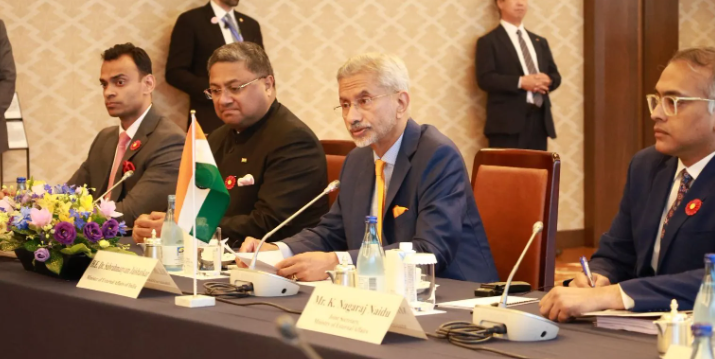Tightrope in the Wind (GS Paper 2, IR)

Introduction
- The joint statement issued at the conclusion of the recent meeting of the Quad foreign ministers—comprising the United States, Australia, Japan, and India—holds significant weight in the current geopolitical climate.
- The Quad, an important strategic forum, underscores the complex diplomatic balancing act India has been performing in the wake of global events, particularly the ongoing Ukraine crisis.
The Diplomatic Tightrope Since the Ukraine Crisis
- Since Russia’s invasion of Ukraine over two years ago, India has faced the challenge of navigating a complex diplomatic landscape.
- The growing divide between the West and the Russia-China bloc, coupled with internal European and American political uncertainties, has compounded India’s balancing act.
- The results of upcoming American elections could further impact European security dynamics, making India’s diplomatic position increasingly precarious.
Quad Summit and Resistance to Unipolarity in Asia
- The recent Quad summit highlighted a collective commitment to countering unipolarity in the Indo-Pacific region.
- India’s endorsement of “a free and open Indo-Pacific” aligns with its strategic interests, particularly in light of China’s assertive actions both in the Indo-Pacific region and along the Line of Actual Control (LAC) with India.
- The Quad forum enables its members to collaborate on technology sharing and regional strategy development, reflecting a united front against dominance by any single country.
Balancing Russia Ties with Western Concerns on Ukraine
- The Quad statement also expressed “deepest concern over the war in Ukraine, including its severe humanitarian impacts.”
- It called for a comprehensive and just peace in accordance with international law, emphasizing sovereignty and territorial integrity.
- This reference serves as a diplomatic maneuver to address concerns raised by Ukraine and US officials regarding Indian Prime Minister Narendra Modi’s visit to Moscow.
- External Affairs Minister S. Jaishankar highlighted his long-standing association with the Quad to reinforce India’s commitment to the grouping.
- Additionally, India plans to send a high-level delegation to Kyiv in August, signaling a nuanced approach to the ongoing conflict.
The Future of Balancing Diplomacy
- India’s primary focus remains the protection of its national interests while adhering to principles of sovereignty and peace.
- The commitment to “territorial integrity” is a reflection of India’s own issues with Pakistan and China, as well as its broader stance on international conflicts.
- Jaishankar emphasized that India’s issues with China should be resolved bilaterally, without external interference.
- However, the path of “multi-alignment” is set to become more complex, particularly with potential shifts in US policy under a possible return of Donald Trump, which could affect European and Chinese strategies.
Conclusion
- India’s recent Quad statement represents a strategic course correction amid criticisms of its perceived closeness to Russia.
- By affirming support for sovereignty and territorial integrity, India signals a balanced approach rather than an endorsement of Russia’s actions in Ukraine.
- Moving forward, India’s foreign policy will need to remain agile and responsive, adapting to evolving global dynamics while maintaining its core principles of diplomacy and national interest.


